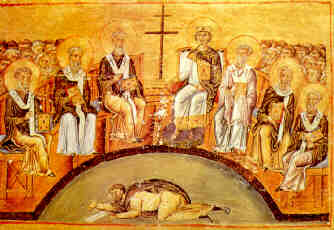
Very early in the life of the church, creeds and doctrinal statements became tools in the hands of political and religious leaders to control crowds and dominate others. While taxation and imprisonment is often a good way to get others to support your causes and force obedience to your laws, such tools do not always work among those who seek to serve a Higher Power, or believe they are following a Divine Law which supersedes human courts.
And so when Christianity became the state religion of the Roman Empire in the fourth century AD, the church rulers and political rulers joined forces to accomplish God’s will “on earth, as it is in heaven.” They saw great benefit in being able to decide where a person would spend eternity, based on how they believed and behaved.
But not everybody believed the same thing. Disagreements arose about what the Bible actually taught, until eventually, both sides of a doctrinal debate condemned and excommunicated their opponents. This led to heated theological debates, and even military skirmishes and minor wars. In an attempt to keep the peace, councils were called and creeds were formed to help determine which side was correct. Often, the Roman Emperors would get involved in these debates, and occasionally it was the Emperor who made the final decision about which theological perspective was correct.
These doctrinal disputes were not so much determined by who had the majority, but by who had the most power and influence in the Roman Empire. This was especially true when one side could gain the support of the Emperor. Whichever side had the ear of the Emperor were most likely to win the debate. And how does one get the ear of the Emperor? Usually, something more is needed than logical arguments about biblical passages. Rulers tend to care more about their coffers and their borders than what the Bible says. So money, power, and land were often used to gain the support of the authorities, rather than sound reasoning from the Scriptures.
 And once the Emperor made his decision, the losing side was often condemned, not only to eternal punishment in hell, but sometimes even to death by stoning, beheading, hanging, or by what became the most popular method: burning at the stake. Emperors do not like it when people in the Empire disagree with them. Dissent was seen as a threat to the peace, order, and prosperity of the Empire. The simplest way to gain unity within the Empire was to get rid of dissenters by killing them. (For a book on this, try Jesus Wars
And once the Emperor made his decision, the losing side was often condemned, not only to eternal punishment in hell, but sometimes even to death by stoning, beheading, hanging, or by what became the most popular method: burning at the stake. Emperors do not like it when people in the Empire disagree with them. Dissent was seen as a threat to the peace, order, and prosperity of the Empire. The simplest way to gain unity within the Empire was to get rid of dissenters by killing them. (For a book on this, try Jesus Wars by Philip Jenkins.)
Though most Christians do not want to admit it today, this was the process by which most of our traditional theology was developed. Not through careful exegesis and logical debate of what the Scriptures say, but through power politics, greedy rulers, and declaring war on all who disagreed.
Thankfully, we don’t do such things today…. Or do we?




Oh, we do……..Maybe not as blatantly – don’t think too many in America, anyway, are killed over doctrinal disputes – not physically, at least. But oh, is this attitude of destroying the dissenters alive and well. Most churches I was involved with create a climate of doctrinal fear/superiority….afraid to question/condescending to questioners. I have become what I used to fear – a questioner. 🙂
Questions are good.
However, sometimes I feel like my many questions are sawing the limb out from under me. It would feel safer to go back to blind certainty about everything I was taught.
I guess I still have some solid ground to stand on…in Jesus. That’s enough for me right now.
“However, sometimes I feel like my many questions are sawing the limb out from under me. It would feel safer to go back to blind certainty about everything I was taught.”
I do understand that feeling. In a sense, my questions did saw the limb out from underneath me. But there was Someone there who held on to me even when I had nothing left to hold on with. In some cases, I think going ahead and sawing the limb off and starting over with God alone is the best thing we can do. I am at a place where there is no blind certainty I could go back to. I’ve seen too much, experienced to much. I think about the guy in The Matrix who got tired of reality and wanted to go back to the illusion – betrayed everyone for that chance. He was not, in the end, able.
Another thought…on safe…a favorite quote from The Lion, The Witch and the Wardrobe came to mind (speaking of Aslan):
“”Then he isn’t safe?” said Lucy.
“Safe?” said Mr. Beaver; “don’t you hear what Mrs. Beaver tells you? Who said anything about safe? ‘Course he isn’t safe. But he’s good. He’s the king I tell you.”
By human reasoning, God is most certainly not safe. And yet, paradoxically, there is no safer place than in Him alone.
“It would feel safer to go back to blind certainty about everything I was taught.”
You can say that again
@Kathy: And the establishment hates questioners.
I’ll just leave this video here… >_> <_<
http://www.youtube.com/watch?v=cncEhCvrVgQ
scary…..especially how many agree
Very scary….and as you say, scary how many agree. I feel so bad for those poor teenagers.
I happen to like Paul Washer, although he can be a bit over the top. I think we need people like him instead of people like Joel Osteen
I would have to disagree……wholeheartedly. Washer is another “Way of the Master” type guy who denies that salvation is a free gift from Jesus. Honestly, I think he is the modern version of a Pharisee.
Honestly, I could only watch about 10 minutes of it…all too familiar from past associations and religious paradigms….
Then I decided to read comments. Very tiring and sad. Doctrinal disagreement? Heretic! Hell bound backslider! Blah, blah, blah…so much energy spent on being P-R-O-V-E-D R-I-G-H-T.
I think you are conflating various different councils and synods throughout the Church’s history and trying to make it seem as if all of them were the same.
For instance, I don’t believe anyone was killed after the the Council of Nicaea in 325 (unless you believe and count the story that Arius spontaneously died after the council, even then in the story his death has only one source).
I don’t deny that many if not all the councils were held in part for political reasons. Constantine, when he was alive, wanted not only a Christian empire, but a united Christian empire with the same beliefs. Nevertheless, the first and even the subsequent early councils were not called at random but because there were people––like Arius, Sabellius, the Nestorians (though not Nestorius), and others––who were teaching things about Jesus, the Father, or the Holy Spirit that, so far as our evidence can tell us, were not being taught by the majority of the Church. Thus, the bishops came together to discuss, heatedly, these matters and come to a conclusion.
Also, I should note that if these councils were evil, we probably should not believe or use anything that came from them. Therefore, we all ought to deny the divinity of Jesus and the Spirit or believe that God has different masks he wears. We will need to throughout our idea of a New Testament cannon, as well.
We need to be students of the past and not throw the proverbial baby out with the proverbial bathwater.
David,
I am definitely conflating various councils and synods. But I had to summarize them all, and it does seem that doctrinal decisions of church councils often have a political motivation behind them.
I don’t think that the councils were evil. I do think that much good came out of them. I am trying to find a good balance between using the creeds and confessions in right and proper ways. I hope in the next week or so to fill some of this out further.
Jeremy,
You didn’t have to summarize them. Or you could have looked at the Ecumenical Councils as opposed to minor councils and synods, or the Ecumenical with East and West and compared them to the later Western ones (the Eastern Orthodox Church has not had an Ecumenical Council since the Seventh one in 787). You could even have looked at early Christian creeds and compared them with later Protestant and Catholic creeds. I’m not trying to be mean, or a jerk, just pointing out that the creeds and councils cannot be lumped together like this.
Also, of course there were political motives, but that doesn’t mean that they can’t be used by God, nor does it mean that they were not equally motivated by their devotion to the risen Lord. I mean think about it, you and all your fellow churches have been teaching that Jesus is God like the Father and the Spirit are God and yet he is also distinct. Then, along come some groups saying either Jesus isn’t God or that He isn’t distinct from the Father (and neither is the Spirit). (I should note that right here we have the birth place of the major ideas about God behind Unitarians and Jehovah’s Witnesses.) Of course you’re going to want to define who Jesus is for your congregation so they aren’t confused by this new teaching. If, you also belonged to some kind of denomination that had a governing body (bishops, a president, etc.) you might even go to them asking them to come up with an official definition. In the case of the early councils, the only real difference is that an Emperor is the one who asked the bishops to settle the matter. Again, his motives were no more likely to be mixed than the preacher who wants to make sure these people teaching something different understand that their definition is different and his (or the church’s) is right.
David,
I am not sure how long you have been reading this blog, but this post here is actually part of a series that has been going on for about three weeks so far, in which I look at at the use and abuse of doctrinal statements.
I have not looked in detail at any creed specifically, so early on, I did focus on the major councils of Christianity.
Also, so far in this series, I have only been looking at the way creeds are abused. Later, I will suggest ways for them to be properly used.
It is all part of a book I am writing called “Close Your Church for Good.” The chapter on doctrinal statements will make more sense when it is all put together, rather than cut up into pieces for blog posts.
no.
Could you be more specific?
Undoubtedly the councils and synods were not all evil, but we should consider the probability that they were likely also not entirely unbiased. Their decisions were made by people. People are imperfect, and tend to reflect certain biases. Add in certain political considerations, including who was allowed to participate in these events, and the probability of problematic decisions is multiplied.
In another time, another place, and with different participants, perhaps the outcomes would have been somewhat similar, but not the same. The creeds might be different, perhaps even the selection of writings that were chosen to be included in the New Testament.
I don’t deny that they weren’t entirely unbiased. I don’t deny that wrong decisions were made at probably all of the councils at some point, but of the councils that truly shaped Christianity, the seven ecumenical councils, while they are ridden with strife and political maneuvering as well as true Christian devotion and worship, I believe that most of what they decided in terms of doctrine is not wrong. I believe in a Holy Spirit that would not allow Christianity to divert so far from its intended path that it would not be until the late nineteenth, twentieth, and now early twenty-first centuries that we finally are beginning to return to what true Christianity was intended to be.
David,
Would you say that the decisions of the councils were inspired by God? I mean, it sounds like you are saying that the Holy Spirit guided the decisions of the councils, in a way that was similar to the way the Holy Spirit guided the writing of Scripture.
And I am definitely not one of those people who think we have only recently rediscovered proper Christianity, or even that the Reformers rediscovered it, or even that we even should try to return to it if it was lost (which I don’t think it was), and if we could rediscover it.
Jeremy,
I like the use of the term guided as opposed to inspired. Ultimately, no I don’t think that what the Councils is on level with what Scripture says because the Spirit’s involvement is different (just as the Spirit’s involvement when a Preacher preaches is different than when a Prophet prophesied in the Old and New Testaments), nevertheless, the Spirit is involved.
And I’m glad you’re not, though your last few posts have really focused on how evil councils and creeds are (remember today’s title is about how they kill when their original intent was to define).
Yes, in some future posts, I will praise the doctrinal statements, and suggest some positive uses for them.
It’s exactly what he didn’t want!